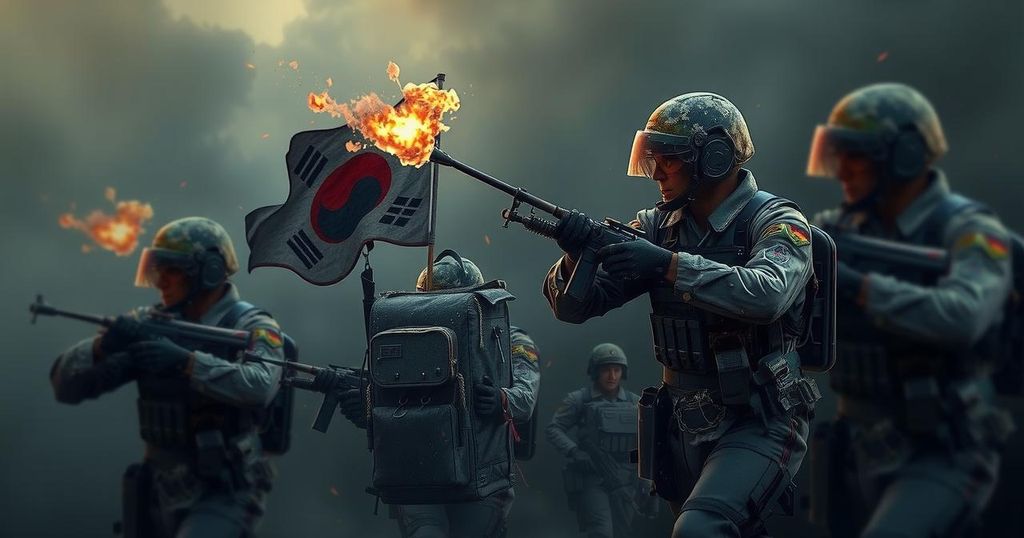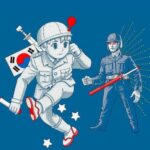South Korea Faces Political Turmoil as Martial Law Sparks Major Protests
In South Korea, President Yoon Suk Yeol declared martial law, inciting protests as parliament voted to invalidate the declaration. Martial law grants military control over civil governance, intended to protect democracy from North Korean threats. However, the opposition condemns the move as unconstitutional, leading to unrest and uncertainty regarding the future of governance in the nation.
In the wake of President Yoon Suk Yeol’s declaration of emergency martial law in South Korea, protests erupted outside the parliament as citizens clashed with military and police forces. This unprecedented move, marking the first martial law in the country since the democratization in 1987, faced immediate dissent as members of parliament voted unanimously to invalidate it, declaring it legally void. Amidst ongoing tensions, questions arise concerning the implications of martial law, its intended purpose by the president, and the public response to the government’s actions.
Martial law effectively transfers governance to military authorities, allowing the military commander to legislate and enforce laws, often suspending civil rights. This measure is typically invoked during crises, such as warfare, uprisings, or natural calamities. The martial law declaration by President Yoon states its purpose as a means to defend democracy against perceived threats, particularly from North Korea. The president accused opposition factions of undermining governmental functionality, particularly in regard to budgetary disputes.
In his announcement, President Yoon asserted, “I declare martial law to protect the free Republic of Korea from the threat of North Korean communist forces… to protect the free constitutional order.” He positioned the declaration as a safeguard against what he described as anti-state forces. Yoon’s government has struggled with legislative gridlock, particularly with his conservative People Power Party clashing with the opposing Democratic Party over contentious budgetary cuts.
Security analysis suggests that President Yoon’s declaration may serve as a strategy to diminish political opposition and retain authority. Professor Michael Clarke stated, “The last thing that liberal democracy needs at the moment is… turning into a short term dictatorship, so I think this is only a short term parliamentary manoeuvre.” Opposition leader Lee Jae-myung condemned the martial law as unconstitutional, insisting that public protests would continue until the declaration is nullified by the parliament.
Despite parliament’s rejection of the martial law invocation, uncertainty looms over whether the president’s administration will acknowledge this decision. Aiding the protestors facing military forces, parliament aides took action, indicating the populace’s dedication to resisting the authoritarian move. The future remains uncertain as South Koreans navigate a complex political landscape marred by instability and rising tensions.
The president’s unilateral introduction of martial law illustrates significant political turmoil within South Korea, evidencing the struggle between elected officials and those seeking to protect governmental integrity. The declaration raises existential questions about the balance of power and democratic governance in the nation, compelling the public and political entities to address concerns about civil rights and governmental authority.
The events transpiring in South Korea reflect a significant political crisis exacerbated by President Yoon Suk Yeol’s declaration of martial law, a rare occurrence since the nation transitioned to democracy in 1987. Martial law entails the military’s temporary takeover of governance, enabling military leaders to enforce laws and curtail civil liberties. President Yoon justified this drastic action as necessary for safeguarding national security against threats from North Korea and maintaining governmental functionality amidst opposition obstruction. This political climate is underscored by heightened social unrest and widespread protests against perceived authoritarianism.
South Korea faces increasing political instability following President Yoon Suk Yeol’s controversial declaration of martial law, leading to widespread protests against the military and government forces. The parliamentary response, which invalidated the declaration, highlights the ongoing struggle between the ruling party and opposition factions over governance methods. As the situation unfolds, the potential for public dissent to influence political processes raises crucial questions about democracy, civil rights, and the future of South Korea’s political landscape.
Original Source: news.sky.com








Post Comment